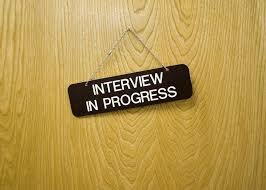
Do you dread that part of the job interview when you get a question that you just don’t know how to answer? Never fear, here’s a run down of five common interview questions and how to approach them.
What are your strengths and weaknesses?
Oooof. I really dislike this question. I think it’s a bit lazy, but a lot of interviewers ask it. They are looking to see how self critical you can be and whether you can give a balanced view. The strength side of things tends not to be too difficult, particularly if you have a job description or advert to work from. If they have asked for someone with a good eye for detail in the advert, it is a good idea to pick that out as a strength and give an example. So you could say something like “I am a stickler for detail. In my current role my colleagues always ask me to proof read their work as I am anal about typos and grammar.” The weaknesses element of this question is more difficult. The most common answer I have heard is “It can take me a while to get things done, because I’m such a perfectionist.” Yawn. I guarantee every recruiter has heard interviewees say that a million times. The basis of the answer is sound – pick something negative and turn it into a positive – but the answer itself is rather dull. So instead, pick something you know you are weaker on but that you are aware of and do something about. For example, you could say “I am terribly impatient and get annoyed when other members of the team don’t deliver in time, but I have learned over the years that everyone’s working style is different so I try to be more laid back about it now and offer to help the others so that we meet the deadlines.”
Where do you see yourself in five years time?
Here, the recruiter is looking to see if you are flighty and if you are really committed to staying in this industry. Recently I interviewed some graduates for an entry level PR position. When asked this question one of the interviewees replied “Oh, I’d love to be teaching in a primary school.” They didn’t get the job. Declaring that your real passions lie elsewhere is not the best technique for interviews. Instead, you should make it clear that you would like to be in the industry you are interviewing for, and that hopefully you will have progressed into a more senior position. You are then reinforcing your commitment to the job and making it clear that you have ambitions to build on your skills and experience.
Why should we hire you?
How good are you at selling yourself? That’s what this question really means. This is your opportunity to give a comprehensive picture of why you are better than the other ten candidates they are interviewing. You need to find a balance between confidence and arrogance. Saying “I’m the best” is arrogant. Saying “I’m the best at my current firm and have handled some really difficult and demanding clients in the last twelve months so I think I could bring some useful skills and experience to your team” is confidence. Justify your reasons with examples of your past experience.
Why are there gaps on your CV?
If you have been out of the job market at some point, it is likely it will be picked up on in interview. The rule of thumb here is, be honest. You may have taken time out to have children, for example. Tell the interviewer that and that you now have excellent childcare arrangements and are committed to going back to work. In the last year, many people have suffered job losses and redundancies due to poor economic conditions. Redundancy doesn’t have the stigma it had ten years ago, so tell the interviewer you were one of several job losses in your firm and that although you were upset to lose your job, you realise your bosses had difficult decisions to make. If at all possible, tell the recruiter how you have kept your hand in, even when you’ve not been working. You may have continued to write a relevant blog, or kept abreast of your sector’s media coverage. Make sure you make it very clear that you are committed to a long-term relationship with your next firm and that your break from employment was for genuinely good reasons.
Do you have any questions?
I have lost count of the amount of people who nothing to say at this point in an interview. Make sure you do your research before you go. Investigate the company website, check out their media coverage, ask people who have worked there before what the firm is like. Compile a list of questions to ask – and take it with you to the interview. At the end, when the interviewer asks if you have any questions you can pull out your list and refer to it. If all your questions have been answered in the course of the interview you can say “well, as you can see I did come with a big list of questions for you, but you have answered them all already, thank you!” It demonstrates that you have done your homework.
Like this:
Like Loading...







